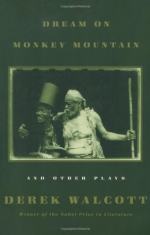|
This section contains 1,403 words (approx. 4 pages at 400 words per page) |

|
Speaking specifically of the anguish of the West Indian, Walcott says, "we have not wholly sunk into our own landscapes," thus defining an inherent rootlessness. It is a concern that numerous writers share, but Walcott, like Wilson Harris, attempts the absorption into the indigenous landscape along with a corresponding exploration of a mind or dreamscape: "a country for the journey of the soul" as Walcott calls it. Both of these geographies the literal and the imaginativeare recreated and fused through language.
It is through language, in fact, that Walcott envisions the salvation of "the New World Negro." "What would deliver him from servitude was the forging of a language that went beyond mimicry, a dialect which had the force of revelation as it invented names for things, one which finally settled on its own mode of inflection, and which began to create an oral culture of...
|
This section contains 1,403 words (approx. 4 pages at 400 words per page) |

|




